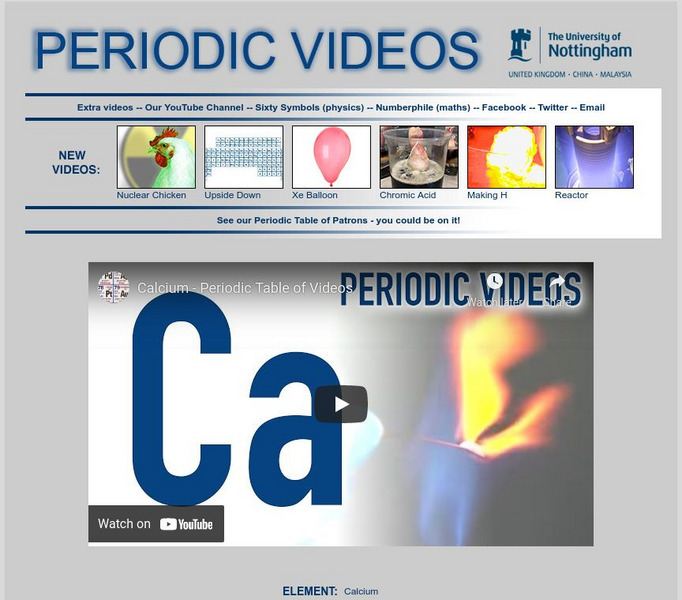University of Nottingham
University of Nottingham: Periodic Table of Videos: Palladium
A look at palladium and its properties that allow it to be used in electrodes, electrical circuits, organic chemistry, and pharmaceuticals. [7:49]
University of Nottingham
University of Nottingham: Periodic Table of Videos: Helium
A video that describes the properties of helium, a nonreactive gas, that allows it to alter your voice, be used in magnets, and refrigeration. Video also includes a demonstration of what happens to a helium balloon when it encounters...
University of Nottingham
University of Nottingham: Periodic Table of Videos: Chlorine
A look at chlorine and its properties that allow it to be used in plastics, bleach compounds, and a toxin. [8:41]
University of Nottingham
University of Nottingham: Periodic Table of Videos: Argon
A look at argon and its properties that allow it to be used in lights. [8:07]
University of Nottingham
University of Nottingham: Periodic Table of Videos: Technetium
Introduction to technetium and the radioactive properties that allow it to be used in medical procedures for disease diagnoses. [10:45]
University of Nottingham
University of Nottingham: Periodic Table of Videos: Lithium
A look at lithium and its reactive properties with water and air. [10:29]
University of Nottingham
University of Nottingham: Periodic Table of Videos: Scandium
A discussion on lesser-known transition metal scandium and its properties that allow it to be easily ionized into sea salts. [7:40]
University of Nottingham
University of Nottingham: Periodic Table of Videos: Niobium
A discussion of niobium and its properties. [9:27]
University of Nottingham
University of Nottingham: Periodic Table of Videos: Gallium
A look at gallium and its low melting point. [7:12]
University of Nottingham
University of Nottingham: Periodic Table of Videos: Vanadium
A brief talk about vanadium that covers its reactivity as a catalyst and its presence in mushrooms. [6:03]
University of Nottingham
University of Nottingham: Periodic Table of Videos: Manganese
A talk about manganese and why it is a key catalyst in the reaction that makes plastics found in water bottles. [9:32]
University of Nottingham
University of Nottingham: Periodic Table of Videos: Chromium
A look at chromium and its properties that allow it to be a plating material that protects metal components. [13:23]
University of Nottingham
University of Nottingham: Periodic Table of Videos: Hydrogen
An experiment showing how water and hydrogen react to form water. Accompanied by a talk on hydrogen's properties that allow it to be used in hydrogen bombs. [7:15]
University of Nottingham
University of Nottingham: Periodic Table of Videos: Iron
A look at iron and its properties that allow it to be used in structural material, blood, and in an oxidation-reduction reaction. [6:01]
University of Nottingham
University of Nottingham: Periodic Table of Videos: Titanium
A talk about titanium and why it is used in airplane manufacturing, white paint pigment, and water purification. [8:31]
University of Nottingham
University of Nottingham: Periodic Table of Videos: Calcium
A look at calcium and its compounds that allow it to be used in chalk and in reactions that produce light. [8:56]
University of Nottingham
University of Nottingham: Periodic Table of Videos: Sulfur
A talk about sulfur and the experiment that shows how photographers used sulfur's reactive properties to produce a flash. [6:30]
University of Nottingham
University of Nottingham: Periodic Table of Videos: Aluminum
A brief talk about aluminum's properties that allow it to be used in foil, in covering for various materials, and in coating on mirrors. [11:52]
University of Nottingham
University of Nottingham: Periodic Table of Videos: Magnesium
A look at magnesium and its properties that allow it to be used in alloy wheels in cars and in the body of pencil sharpeners. [6:37]
University of Nottingham
University of Nottingham: Periodic Table of Videos: Fluorine
A look at fluorine and its very reactive properties. [6:42]
University of Nottingham
University of Nottingham: Periodic Table of Videos: Nitrogen
Learn about the strong bonds that nitrogen forms and why this element can be used in explosive compounds and as a coolant. [12:53]
University of Nottingham
University of Nottingham: Periodic Table of Videos: Carbon
Video explains carbon's unique properties, which allow it to be soft and used as a lubricant or to be hard and used in diamonds. Carbon is also described as being the basis for life and a standard for measuring the weight of other atoms....
University of Nottingham
Periodic Table of Videos: The $8,539 Book and Silicon 29
Why would a text on silicon-29 cost over $8,000? Debbie Kays, a lecturer in inorganic chemistry at the University of Nottingham, tackles this question, first explaining why silicon-29 is so important and then offering reasons why the...
University of Nottingham
Periodic Table of Videos: Mercury Bell
See the element mercury in solid form, frozen in the shape of a bell. Dr. Andrea Sella explains the process of making the bell and why he made it, while highlighting some important properties of mercury. [5:05]























